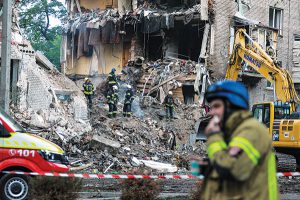Bloomberg
Group of Seven leaders vowed to support Ukraine “for as long as it takes†and condemned Russia’s recent steps to escalate its war there “in the strongest possible terms.â€
During a 90-minute video call Tuesday with Ukrainian President Volodymyr Zelenskiy, G-7 leaders pledged their “undeterred and steadfast†commitment to helping the government in Kyiv “uphold its sovereignty and territorial integrity.â€
“We will continue to provide financial, humanitarian, military, diplomatic and legal support and will stand firmly with Ukraine for as long as it takes,†the leaders of the US, Germany, Japan, France, Italy, Canada and the UK said in a joint statement. They also promised to “impose further economic costs on Russia†and “to coordinate efforts to meet Ukraine’s urgent requirements for military and defense equipment.â€
The G-7 leaders conferred one day after Russia launched a series of missile strikes in Kyiv and a dozen other cities that struck key infrastructure targets, as well as civilian sites.
In their statement, they said that such “indiscriminate attacks on innocent civilian populations constitute a war crime†and that they would hold President Vladimir Putin “and those responsible to account.â€
They also exchanged views on the Opec+ decision last week to cut oil production by 2 million barrels a day, according to a G-7 official. Leaders discussed whether to add a critical remark on the move to their final statement, but they ultimately dropped the idea, said the official, who asked not to be identified discussing confidential talks.
In their published statement, the leaders attacked what they called “deliberate Russian escalatory steps†and said the tactics were “putting European and global peace and security at risk.†They didn’t provide details of any specific new steps they would take or weapons they would supply to Ukraine.
They said they were “deeply troubled†by what they called the “deliberate damage†last month to the Nord Stream gas pipelines in the Baltic Sea that transport Russian gas to Germany’s north coast.
Swedish investigators said last week that detonations caused the ruptures, with the evidence pointing to a deliberate act that Germany’s vice chancellor suggested was ordered by the Kremlin. Russia has denied responsibility and asked that its authorities and state-owned gas company Gazprom PJSC be allowed to join the investigation.
The incidents sparked fears that Russia could stage surreptitious attacks on vital energy links to trigger price increases as winter approaches.
“We strongly condemn any deliberate disruption of critical infrastructure,†the G-7 leaders said, toning down language in an earlier draft seen by Bloomberg that referred to “reckless and irresponsible acts of sabotage.â€
They also left out a threat that “any deliberate disruption of critical infrastructure†would be met “with a united and determined response.â€
The final statement included a reference to Belarus that wasn’t in the draft. Leaders reiterated a call for the government in Minsk to “stop enabling the Russian war of aggression by permitting Russian armed forces to use Belarusian territory and by providing support to the Russian military.â€
Russia’s atomic grab
in Ukraine corners
international monitors
Russia’s plunder of the biggest nuclear power plant in Europe risks undercutting efforts to establish a security zone around the reactors and has narrowed the room for diplomacy with international monitors, according to analysts.
International Atomic Energy Agency Director General Rafael Mariano Grossi is meeting Russian President Vladimir Putin on Tuesday in St. Petersburg, where the two are expected to discuss nuclear safety concerns around the Zaporizhzhia Nuclear Power Plant, according to a Kremlin statement.
Russia claimed ownership over the plant — home to six reactors built to supply a fifth of Ukraine’s electricity — last week as part of a wider “annexation†of occupied territory in Ukraine in a move condemned by the United Nations. Moscow also told the plant’s Ukrainian staff to reapply with Russian state-owned atomic energy company Rosatom to keep their jobs.
The theft of the site is complicating IAEA talks to create a safety zone around the plant after repeated attacks cut power and water supplies, forcing the reactors to shut down.
“The risk is that if the IAEA makes a deal with Russia that enables improvement of security and safety around the plant, the agency could appear to be legitimizing Russian claims of sovereignty over the territory,†said the Berlin-based Carnegie Endowment for International Peace analysts Mark Hibbs.
 The Gulf Time Newspaper One of the finest business newspapers in the UAE brought to you by our professional writers and editors.
The Gulf Time Newspaper One of the finest business newspapers in the UAE brought to you by our professional writers and editors.
